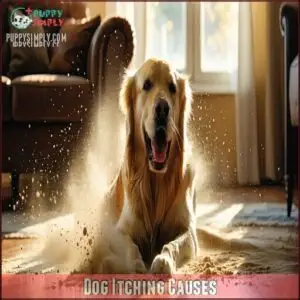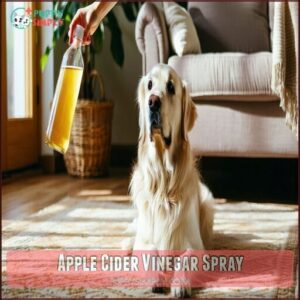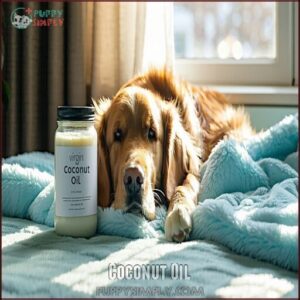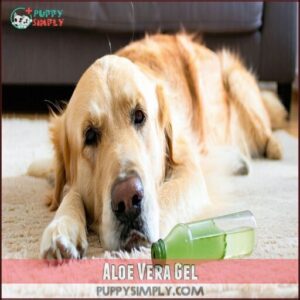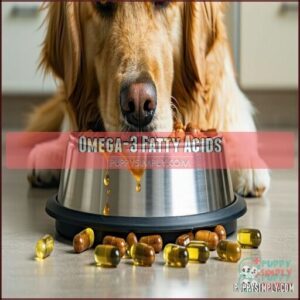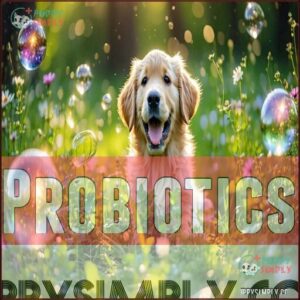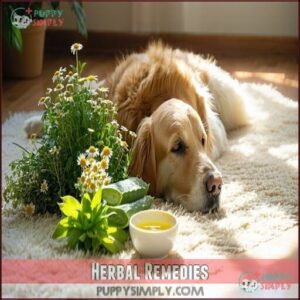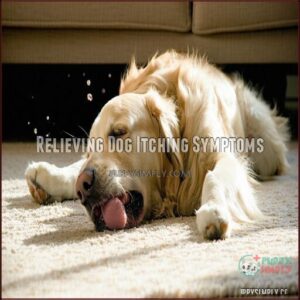This site is supported by our readers. We may earn a commission, at no cost to you, if you purchase through links.
 If your dog’s itching feels endless, don’t worry—you’ve got options.
If your dog’s itching feels endless, don’t worry—you’ve got options.
Start with soothing oatmeal baths to calm irritated skin or try coconut oil for a quick moisture boost.
Apple cider vinegar diluted with water works wonders for itch-causing bacteria, but skip it if there are open wounds.
Omega-3 supplements, like salmon oil, don’t just help the skin—they’re great for overall health too.
For fast relief, itch-relief sprays or special shampoos can save the day.
Always check for fleas, allergies, or other triggers.
A little attention goes a long way in keeping your pup comfy—and there’s more to explore on this!
Table Of Contents
- Key Takeaways
- Dog Itching Causes
- Top 4 Dog Itching Remedies
- Home Remedies for Itch Relief
- Natural Remedies for Itchy Skin
- Relieving Dog Itching Symptoms
- Frequently Asked Questions (FAQs)
- What can I give my Dog for itchy skin?
- How to medicate a dog with itchy skin?
- How do I get my Dog to stop itching?
- How to treat dog skin rashes & itchy skin?
- How to treat dog skin rashes & itchy skin?
- What is the best home remedy for dogs itching?
- How do you treat itchy skin on dogs?
- Does Dawn dish soap help itchy dogs?
- How do I stop the itching?
- How do you treat a dog’s Itchy paws?
- Conclusion
Key Takeaways
- Check for common triggers like fleas, food allergies, seasonal irritants, or infections to stop the itching at its source.
- Use home remedies like oatmeal baths, coconut oil, or chamomile tea soaks to soothe your dog’s itchy skin naturally.
- Consider omega-3 supplements, allergy chews, or vet-recommended shampoos for targeted relief and long-term skin health.
- Avoid apple cider vinegar on open wounds and consult your vet if the itching persists or worsens.
Dog Itching Causes
Your dog’s itching can stem from many sources including parasites, food and environmental allergies, seasonal triggers, or infections that irritate their skin.
Understanding what’s causing your furry friend’s discomfort is the first step to finding the right solution, just like knowing why you’re sneezing helps you pick the right allergy medicine, and this understanding is key to addressing the issue effectively with the right treatment.
Fleas and Parasites
Fleas and parasites are the culprits behind nearly 50% of all dog itching cases.
These tiny troublemakers—like fleas, ticks, and mites—can trigger intense irritation and even allergic reactions.
When your pup can’t stop scratching, check for these unwelcome guests in their fur.
Effective flea prevention, regular tick control, and maintaining deworming schedules are essential first steps in tackling parasite symptoms.
Food Allergies
Your dog’s itchy skin could be their body’s cry for help against food allergies. These reactions typically develop from repeated exposure to certain ingredients like chicken, beef, or grains.
Itchy skin can signal food allergies—often caused by repeated exposure to common ingredients like chicken, beef, or grains.
Consider an elimination diet with novel proteins or limited ingredients to identify triggers. Allergy testing can pinpoint specific culprits faster, while switching to hydrolyzed proteins often provides relief.
A hypoallergenic diet might be the simple solution your scratchy pup needs.
Environmental Allergies
Many dogs develop environmental allergies (atopy) that turn their skin into an itchy battlefield.
Your furry friend might be reacting to common household triggers you’ve never suspected.
The five main environmental allergens that cause dog itching are:
- Dust mites hiding in bedding and carpets
- Mold spores in damp areas
- Household cleaning products
- Air fresheners or scented candles
- Fabric softeners on blankets
Seasonal Allergies
While indoor irritants can be controlled, the outdoor world brings a whole new challenge.
Seasonal allergies follow a predictable allergy calendar, with pollen exposure peaking at specific times.
Your pup’s Spring Itch or Fall Allergies depend on what’s blooming.
| Season | Common Dog Seasonal Allergies |
|---|---|
| Spring | Tree Pollen, Grass Seeds |
| Summer | Grass Pollen, Insect Saliva |
Infections
While seasonal allergies come and go, infections can be stubborn guests on your dog’s skin.
Bacterial and fungal troublemakers often cause intense itching that won’t quit.
Five common skin infections that make dogs scratch:
- Yeast infections (often smelly with dark discoloration)
- Bacterial pyoderma (red bumps and pustules)
- Bacterial overgrowth (greasy skin with odor)
- Hot spots (moist, raw patches)
- Fungal infections (circular patches with hair loss)
Changes in coat condition can also be a sign, so monitor any appearance changes to identify potential skin infections and take action against bacterial and fungal issues.
Top 4 Dog Itching Remedies
You’ll find fast relief for your itchy dog with these four proven remedies that tackle the problem at its source.
From soothing salmon oil to specialized shampoos and targeted sprays, these solutions help stop the scratching.
So you can both get back to enjoying life together.
1. Alaskan Salmon Oil for Healthy Dogs
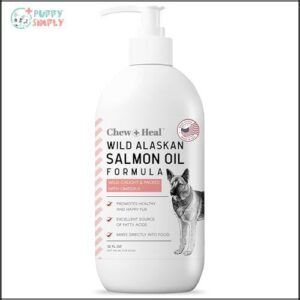 View On Amazon
View On Amazon
Relief comes in a bottle with pure wild Alaskan salmon oil.
Pure wild Alaskan salmon oil soothes itchy skin, promotes a shiny coat, and brings relief your dog will notice.
You’ll notice how this omega-rich supplement forms a protective barrier against skin irritants, reducing your dog’s itchiness and scratching.
The pump dispenser makes dosing easy—just ½ teaspoon per 25 pounds daily.
Your pup will enjoy the flavor while the EPA and DHA omega-3s (over 1200mg per serving) work to soothe dry, flaky skin and promote a shinier coat.
Most owners see improvement within weeks, with many reporting reduced shedding and healthier skin that lasts.
Best For: Dog owners looking to improve their pet’s skin, coat, and overall health with a natural, omega-rich supplement.
- Rich in Omega-3 and Omega-6 for healthy skin and coat.
- Easy-to-use pump dispenser for mess-free dosing.
- Dogs enjoy the flavor, making it easy to administer.
- Large 32-ounce bottle may be inconvenient for small dog owners.
- Must be used within 30 days of opening.
- Some dogs may revert to coat issues if switching brands.
2. TropiClean Allergy Itch Relief Shampoo
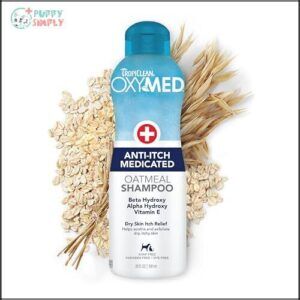 View On Amazon
View On Amazon
TropiClean Allergy Itch Relief Shampoo works wonders for dogs suffering from dry, itchy skin.
This vet-recommended formula combines oatmeal with alpha hydroxy, beta hydroxy, and tea tree oil to quickly soothe inflamed skin while exfoliating and cleansing pores.
It’s gentle yet effective – free from soap, parabens, dyes, and never tested on animals.
For best results, pair it with their treatment spray.
The shampoo relieves common skin conditions like scaling and hot spots, and also hydrates and restores your pet’s skin while eliminating body odor.
Best For: Pets with dry, itchy, and irritated skin, including those suffering from conditions like scaling, hot spots, and dandruff.
- Soap-free, paraben-free, dye-free, and cruelty-free formula.
- Combines oatmeal, alpha hydroxy, beta hydroxy, and tea tree oil for fast itch relief and skin hydration.
- Vet-recommended for soothing inflamed skin and eliminating pet body odor.
- Requires pairing with a treatment spray for best results.
- May not address underlying causes of severe skin conditions.
- Not suitable for pets with allergies to any listed ingredients.
3. Hot Spot Itch Relief Spray
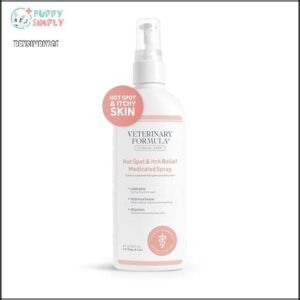 View On Amazon
View On Amazon
Sometimes, dogs can’t stop scratching, and that’s where Hot Spot Itch Relief Spray shines.
This easy-to-use spray quickly soothes itchy skin, reduces inflammation, and helps heal pesky hot spots caused by allergies or insect bites.
Blended with calming lavender and neem oils, it promotes healthy skin while discouraging licking or scratching.
Designed for both dogs and cats over 12 weeks old, it’s a versatile solution between baths, with a non-irritating formula that guarantees comfort, so your furry friend can finally relax, thanks to its ability to provide healthy skin.
Best For: Pet owners looking for a fast-acting, non-irritating spray to soothe itchy skin and reduce inflammation in dogs and cats over 12 weeks old.
- Reduces itching, inflammation, and hot spots quickly.
- Made with non-irritating, pet-safe ingredients like lavender and neem oils.
- Can be used between baths for added convenience.
- Not suitable for pets under 12 weeks old.
- Requires consistent application for persistent issues.
- May not fully solve severe skin conditions without additional treatment.
4. Dog Allergy Itch Relief Chews
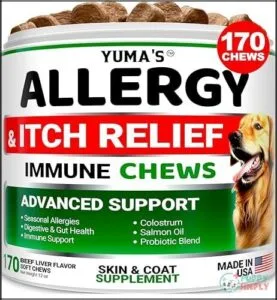
How do you tackle relentless itching in dogs?
Allergy itch relief chews might be your best bet. These tasty chews are packed with immune-boosting nutrients and omega fatty acids to combat food, seasonal, and environmental allergies.
Formulated by veterinarians, they soothe itchiness, reduce paw licking, and improve your dog’s skin and coat health. For some dogs, environmental allergens are problematic, making these chews a helpful addition to their care.
Whether you’ve got a playful pup or a wise old senior, these chews suit all ages and sizes. Plus, their convenient, chewable format makes allergy relief hassle-free, providing a solution for relentless itching with omega fatty acids and offering a way to improve your dog’s skin and coat health.
Best For: Dogs of all ages and sizes struggling with relentless itching, allergies, and skin or coat issues.
- Packed with nutrients and omega fatty acids for skin and coat health.
- Convenient chewable format makes it easy to give.
- Formulated by veterinarians to address various allergy types.
- May not work for all dogs with severe allergies.
- Requires up to 2 months of use for full effects.
- Some dogs may dislike the flavor.
Home Remedies for Itch Relief
You don’t need fancy products to help ease your dog’s itching—simple solutions at home can work wonders.
From soothing oatmeal baths to calming tea soaks, these remedies are easy to use and surprisingly effective.
Colloidal Oatmeal Baths
An oatmeal bath is a gentle way to ease itchy skin.
Colloidal oatmeal reduces inflammation and moisturizes dry patches.
Here’s how:
- Oatmeal Preparation: Blend oats into a fine powder.
- Bath Frequency: Once a week is ideal.
- Water Temperature: Use lukewarm water for comfort.
- Soak Duration: Let your pup soak for 10 minutes, then rinse thoroughly.
Many owners find specific dog products helpful.
Chamomile and Green Tea Soaks
A chamomile and green tea soak is one of the soothing dog remedies that works wonders.
Brew the tea with lukewarm water, ensuring the water temperature feels comfortable.
Let your pup soak for a Tea Soak Duration of five minutes, or use tea bags for Spot Treatment on itchy areas.
This natural remedy improves Skin Patch Effectiveness, calming irritation effectively.
Apple Cider Vinegar Spray
If your dog’s itching has you scratching your head, try apple cider vinegar spray.
This classic remedy helps with yeast infections and dog skin allergies.
Mix a 50/50 vinegar dilution and water, but don’t use it on broken skin.
Spray lightly and monitor for licking prevention. It’s a simple, natural option for itchy dog relief!
Many pet owners find online vinegar products beneficial, making it a natural option.
Coconut Oil
Coconut oil works wonders for natural dog itch relief. It hydrates flaky skin, reduces inflammation, and soothes irritation.
Here’s how to use it:
- Massage it in: Apply a small amount on dry patches for immediate moisture.
- Boost meals: Mix a teaspoon with food for added benefits.
- Pick wisely: Opt for unrefined or virgin coconut oil.
It can also help with flea and tick prevention. Safe, simple, effective!
Aloe Vera Gel
Aloe vera gel can work wonders for calming irritated skin. Its cooling effects soothe redness and itching, offering natural dog itch relief.
Apply a safe dosage—just a thin layer—to avoid overuse. Aloe’s gel properties provide moisture while accelerating healing.
Always use pure aloe gel, free from harmful additives.
| Benefit | How It Helps | Usage Tip |
|---|---|---|
| Cooling effects | Reduces redness | Apply thinly on hot spots |
| Gel properties | Moisturizes skin | Use pure aloe gel only |
| Redness reduction | Calms irritation | Avoid if skin is broken |
Natural Remedies for Itchy Skin
You can naturally soothe your dog’s itchy skin with simple, effective remedies that are easy to try at home.
From diet changes to herbal options, these solutions address the root causes and give your furry friend much-needed relief.
These simple remedies are designed to provide comfort to your dog.
Dietary Changes
Diet can play a major role in relieving your dog’s itchiness.
Try these tips:
- Use a limited-ingredient diet to pinpoint food allergies.
- Incorporate a hypoallergenic diet with novel proteins like venison or duck.
- Focus on AAFCO-approved, nutrient-rich foods for gut health.
- Consult your vet before supplementation or dietary shifts.
Food can be medicine, especially for sensitive pups!
Omega-3 Fatty Acids
Ever wondered how omega-3 fatty acids can help? These healthy fats, found in fish oil like salmon oil, improve skin health, reduce inflammation, and ease itching fast.
Choose high-quality supplements for better absorption rates. Follow dosage guidelines to avoid overdoing it.
You can find omega 3 products for your dog online. Omega-3 benefits also include a shinier coat and fewer allergies.
Simple dog itching remedies often start with omega-3s!
Probiotics
A happy gut makes for a happy dog!
Probiotics boost gut health, which improves the immune response and balances the skin microbiome.
They’re game-changers for allergy relief, especially with dog food allergies or allergy symptoms.
Look for quality probiotic strains in dog itching remedies or specialized diets to help soothe those itches and keep your pup comfy.
Herbal Remedies
Herbal remedies can safely ease your dog’s itching.
Many are simple and effective at-home fixes:
- Chamomile and green tea soaks reduce skin inflammation.
- Calendula salves soothe irritated patches and promote healing.
- Coconut oil benefits skin by hydrating and calming redness.
- Aloe vera gel provides cooling relief for hot spots.
Always check herbal safety with your vet!
Relieving Dog Itching Symptoms
You can help your itchy dog feel better by addressing the root cause and soothing their skin with the right care.
From identifying triggers to maintaining a proper diet, consistent efforts make a big difference.
Identifying and Avoiding Triggers
Dogs scratch for many reasons, but pinpointing the cause is key.
Allergen identification through allergy testing can help spot food allergies, environmental allergies, or seasonal allergies. Control flea bites, tweak diets with elimination trials, or adjust their environment.
Think of seasonal prevention as prepping for battle—less pollen, happier pups!
Here’s how to spot and avoid triggers:
| Trigger Type | Example | Detection Method | Avoidance Tip | Related Allergy Type |
|---|---|---|---|---|
| Food allergies | Chicken | Elimination diet | Change protein source | Food allergies |
| Environmental allergies | Dust mites | Allergy testing | Regularly clean bedding | Environmental allergies |
| Seasonal allergies | Pollen | Observing symptoms | Limit outdoor exposure | Seasonal allergies |
| Parasite irritants | Flea bites | Flea comb check | Use flea prevention products | Flea allergy |
| Indoor irritants | Mold | Allergy testing | Keep spaces well-ventilated | Environmental allergies |
Using Calming Aids
Sometimes reducing your dog’s stress can ease itching.
Calming aids, like supplements or sprays, work wonders for anxiety reduction and behavioral modification.
Try these:
- Calming supplements with chamomile or melatonin.
- Pheromone diffusers for stress relief.
- Anti-anxiety wraps, like ThunderShirts.
- Interactive toys for environmental enrichment.
- Music therapy to soothe nerves.
Itchy pups scratching excessively deserve some peace!
Providing Skin Care
Caring for your dog’s skin promotes comfort and health.
Focus on hydration and reinforcing their skin barrier function with topical treatment types like oatmeal shampoo or coconut oil.
Preventative skincare reduces dog dander and itching.
Address wounds, dog skin rashes, or dog dry skin quickly to avoid infections.
Proper care supports long-term relief, keeping your pup itch-free and happy.
For long-term skin infections, consider a chlorhexidine based shampoo.
Maintaining a Healthy Diet
A balanced diet plays a huge role in easing your dog’s itching.
Focus on allergy elimination with a limited-ingredient diet and include omega-3 fatty acids like salmon oil.
Proper weight management and hydration importance can’t be overstated.
Dietary supplements can fill nutritional gaps, and choosing high-quality dog food helps maintain healthy skin, ensuring freedom from constant scratching and discomfort.
Frequently Asked Questions (FAQs)
What can I give my Dog for itchy skin?
It’s uncanny how your pup’s scratchy woes mirror ours.
Try coconut oil to moisturize, colloidal oatmeal baths for soothing, or fish oil supplements.
Avoid apple cider vinegar if the skin’s broken.
Consult the vet!
How to medicate a dog with itchy skin?
To medicate an itchy dog, consult your vet first.
Use treatments like medicated shampoos, topical ointments, or antihistamines as directed.
For home remedies, try oatmeal baths or coconut oil, but avoid broken skin areas.
How do I get my Dog to stop itching?
Think of your dog’s itch like a mystery to solve.
Check for fleas, allergies, or infections, then try oatmeal baths, coconut oil, or fish oil.
If the scratching persists, consult your vet for targeted treatment.
How to treat dog skin rashes & itchy skin?
Give your dog a soothing oatmeal bath to calm itchy skin.
Or try applying coconut oil for hydration and relief.
Use chamomile tea soaks or baking soda paste for quick fixes, but avoid broken skin.
How to treat dog skin rashes & itchy skin?
To treat dog skin rashes and itching, try oatmeal baths, soothing teas, or coconut oil for relief.
Avoid apple cider vinegar on open wounds.
For severe cases, consult your vet to guarantee proper care and treatment.
What is the best home remedy for dogs itching?
A soothing oatmeal bath works wonders for dog itching, calming irritation and moisturizing the skin.
Combine finely ground oatmeal with warm water, let it sit on their coat for 10 minutes, then rinse thoroughly.
How do you treat itchy skin on dogs?
When your dog’s itchy skin won’t let up, try soothing it with a relaxing oatmeal bath or a dab of coconut oil.
Avoid harsh chemicals, and if the problem persists, call your vet.
Does Dawn dish soap help itchy dogs?
Dawn dish soap can help remove fleas and allergens causing itchiness, but it’s not ideal long-term.
It might dry out your dog’s skin, so pair it with a moisturizer or use vet-recommended solutions instead.
How do I stop the itching?
Think of itchy skin like a bad playlist on repeat—it needs a reset.
Try soothing baths with colloidal oatmeal, apply coconut oil for moisture, or use an apple cider vinegar spray to calm irritation.
How do you treat a dog’s Itchy paws?
Try a lukewarm paw soak with chamomile tea to ease inflammation.
Mix equal parts water and apple cider vinegar for a quick antibacterial rinse (avoid open sores).
Coconut oil soothes itchy patches while moisturizing cracked pads, providing an additional layer of moisturizing care.
Conclusion
Battling dog itching can feel like chasing your tail, but with the right remedies, relief is closer than you think.
From soothing oatmeal baths to omega-3 supplements, these solutions work wonders for your pup’s comfort.
Don’t ignore the basics—check for fleas, allergies, or other triggers.
Combine natural methods like coconut oil or apple cider vinegar with specialized products for faster results.
Your dog’s health and happiness matter, so tackle that itch today with these proven dog itching remedies!
- https://www.vet.cornell.edu/departments/riney-canine-health-center/canine-health-information/atopic-dermatitis-atopy
- https://www.spandidos-publications.com/ijmm/26/6/935
- https://www.petinsurance.com/hamboneaward/news/nationwide-reveals-the-10-most-common-medical-conditions-for-dogs-and-cats/
- https://www.healthline.com/health/oatmeal-bath-for-eczema

